- Home
- Melissa de la Cruz
All for One Page 4
All for One Read online
Page 4
“Thanks for losing my page,” he said with a grin. She had looked so serene when he walked in, he hadn’t meant to rouse her. But the opportunity to tease his dear wife was just too irresistible.
“It’s Richardson,” Eliza said drowsily. “Every page is the same. Some poor maid is pretending to fend off the advances of her master, but secretly hoping the mistress will die so she can marry him and take her place. Just once I’d like to read a story where it is the man who is poor and is making love to a woman to try to get her property.”
Alex laughed. “That would require a change in property laws, among other things. Thanks for spoiling the plot, too.”
“Ever the lawyer,” Eliza said, rolling her eyes. “How did Johnny fare today?”
“You mean John,” Alex informed her. “He’s asked us not to call him by his family nickname anymore. He’s not here?”
“I don’t think so?” Eliza said. “Unless he snuck in while I was sleeping. But if he did I’m sure he’d have drawn a mustache on my face or something equally as sophomoric.”
“I left him at the college this morning. Somehow I failed to realize that Brockholst Livingston is also Henry Livingston, Governor Livingston’s son.”
“Yes, that’s why I was originally going to meet with him instead of you. Brocky used to follow me around like a puppy when we were children. I figured I could dispose him favorably toward John.”
“John seems to have that angle covered,” Alex said. “I am not sure if we are sending him to school or merely to a fraternal organization.”
“Hmm,” Eliza said. “Should I be worried?”
“Oh, he’s probably just running errands in anticipation of his classes. It’s a new city and he doesn’t know where everything is. I’m sure he’ll be in shortly.”
And just then the door opened and John came in, a sheepish smile on his wine-stained lips. When prompted for details of his day, he explained that he had stopped for a bite to eat at a charming inn and met a passel of “capital fellows” as well as “a few charming lassies.” One thing led to another, and here he was, a few hours later than expected, though “none the worse for wear.” He had supped at the inn, and if Alex and Eliza didn’t mind, he was going to take himself straight to bed. Without waiting for an answer, he staggered up the steps. A few moments later, they heard the creak of bedsprings as he fell into bed, they could only assume still fully clothed.
“None the worse for wear?” Alex quipped. “We’ll see if he’s still singing the same tune in the morning!”
* * *
• • •
THOUGH JOHN SLEPT in till half past ten, when he did finally wake, he was as energetic as a five-year-old. He wolfed down a few slices of hearty bread slathered with butter (as Rowena had already departed north to the Beekman farm to visit Simon), then announced he had to buy books for class, and vanished out the front door. Alex said he had a half day’s work to catch up on because of yesterday’s college visit, and headed out shortly after, leaving Eliza alone in the house. Her stomach was churning. Despite the fresh eggs she’d purchased yesterday, Rowena still managed to sour them before she headed out that morning. Or perhaps it was not Rowena’s cooking at all that had turned her stomach? Perhaps—could it be? But after so much heartbreak, to even think the thought was to jinx it, and so Eliza banished it from her mind.
“Sod all,” she said out loud. “This time I really am taking the day in bed.”
It felt positively sinful to crawl back between the covers at eleven in the morning. Her mother was a firm believer that “idle hands make for the devil’s work,” but she believed even more strongly that an idle mind was a truly dangerous thing. Daydreaming was an invitation to free-thinking; novel-reading was even worse since it gave picture to heretofore unimagined ways of life. To hear Mrs. Schuyler tell it, all of humanity had lived in sensible brick houses (though perhaps not quite as stately as her own) since Adam and Eve left the Garden, and the goals of any good housewife should be kept to seeing that the floors were waxed, the plate polished, the table surrounded by only the most desirable dinner guests, and the nursery stocked with a fresh infant every fourteen to eighteen months. Eliza had the shiny floors and shinier silver; her dining room rang with the voices of the men and women who were creating the United States of America out of the disparate and constantly squabbling thirteen colonies. Only the nursery remained starkly empty.
Eliza heated some water, made a pot of herbal tea, and brought it up to the bedroom, where she plumped the pillows so she could sit up comfortably. Moll Flanders sat on the bedside table expectantly, but she opened a drawer and pulled out a passel of letters instead. Intrigued as she was by the story waiting between the book’s pages, she hadn’t the energy to devote to such a strenuous pursuit and decided to focus what little strength she had on family matters.
Ever since her own brood had started to arrive, Angelica’s stories of London were equal parts lords and ladies and soiled nappies; Peggy’s letters from Rensselaerswyck had their own tales of infant joy: she and Stephen had welcomed daughter Catherine—named after both their mothers—just a few months ago. Eliza had meant to cheer herself by revisiting her deeply missed sisters, at least in prose, but all the stories of new toys and new dresses and first steps and first words left an ache in her heart that was more painful than her restive stomach.
Of course, these days she had been keeping herself busy with church and the orphans and arranging her and Alex’s social calendar to benefit both his career and her charity work, but she had always expected that by now these activities would be arranged around her duties as a mother. Without that missing piece, her life seemed a bit hollow somehow.
“You’re letting us down,” she said, wagging her finger at her stomach, which rumbled in reply.
In truth, though, the inactivity felt like a necessary respite after the day-in, day-out hustle of the past year and a half. The Hamiltons barely had a moment to themselves since Alex’s career had taken off, and if their social life was electrifying, it was also so all-consuming that Eliza hardly had time to realize just how tired she was. No wonder she hadn’t been able to conceive. Her poor body needed energy, and it was all going to carrying her from luncheon to play to ball to bat mitzvah (a moving Jewish ceremony that Eliza’s acquaintance Ruth Levy invited her to, to celebrate her daughter Sarah’s coming of age), and back again, in an endless cycle of gaiety.
As she thought back to the joyously exhausting barrage of events, she basked anew in the quiet of her bedroom. One solitary day away from all that was just what she needed! To close her eyes and sleep with the warm sunlight on her face was simply heaven!
But only an hour later she was up again. Sleeping all day just wasn’t in her. She was a Dutch vrouw to her core.
She decided to call on the Schlesingers to see if they had given her proposition any thought. Perhaps—oh, but this was mischievous!—she would stop by the rectory first and fetch little Gus to come with her. No one could resist the boy’s plump cheeks and flashing eyes. She had half a mind to adopt him herself, even though she had promised herself not to choose favorites.
Eliza threw open a window and stuck her arm out. The day was as warm as it looked, and grabbing her lightest lace shawl more for decoration than for cover, she raced down the stairs, already anticipating the smile on Gus’s face when she greeted him at the rectory. On second thought, she decided she would just pop in and say hi. It wouldn’t be fair to take him to the Schlesingers’. If they said no, it would be too painful . . . for Gus and for her. Even if he didn’t understand exactly what was happening, the sadness would be palpable. Children pick up on those kinds of things.
I must have a treat for him, she thought, and so she continued down to the kitchen to search for some cherries or grapes. The faint smells of bread and meat and butter tickled her nose as she pushed open the door—
“Oh!” a voice exclaimed
.
“Oh!” Eliza echoed, startling at the sight of a strange boy of about sixteen or seventeen sitting on the lip of the butter churn: “Who are you?!”
“E-e-excuse me!” the boy stammered. “I thought Mrs. Wilcox was expecting me but she—”
“Mrs. Wilcox? Rowena? How do you know her? And why are you in my kitchen?” Eliza demanded.
“As I said, I thought I was expected. I mean, I was sent for—”
“Sent for? By Rowena?” Suddenly it hit her. “Are you Drayton?”
The boy nodded his head vigorously, then, for good measure, bowed. “Yes, ma’am. Drayton Pennington, at your service.”
“Oh!” Eliza said nervously. “Well, I must say, you gave me quite a start. I had completely forgotten you were coming. As has Rowena, apparently.”
“I—I’m sorry, ma’am. I—I guess I can go home and try again some other time.”
Eliza grinned at the good-natured boy. “As I recall, home is the Ohio Territory. It seems a rather far distance to go just because someone is not here to greet you.”
“Indeed, yes, ma’am, I suppose it is. I, um, I guess I could go back to the river and wait where the boat left me. When—that is, do you know when Aunt Rowena will be back?”
“Not till the morrow, I’m afraid. We’ve sent her off to visit Simon in the hopes that she’ll stop mooning about.”
“Simon!” Drayton’s face brightened. “He was barely born when we left. I’m glad to hear he’s doing well. He was a sickly child, you know.”
“Well, he’s healthy as a horse now, and riding them all the time, too, if the reports from Mount Pleasant are to be believed.”
“Mount Pleasant, ma’am?”
“Never mind about that. Well, no, if you’re here to become a footman, then you must learn who’s who so you can greet them properly. Mount Pleasant is the estate of the Beekman family. The pater is Jonas and his wife is Catherine. James and Jane, their eldest son and daughter, are Mr. Hamilton’s and my good friends.”
“Jonas, Catherine, James, Jane,” the boy repeated gamely, as though it were multiplication tables. “And pardon me for asking, but you are Mrs. Hamilton, yes?”
Eliza slapped her head. “How very rude of me. Here I am grilling and lecturing you, and I haven’t even introduced myself.” She took the last step into the kitchen and walked toward Drayton with her hand outstretched. The boy didn’t exactly shrink into the wall, but he looked as if he wanted to. “I am indeed Eliza Hamilton,” she said, taking his limp hand and squeezing it in hers. “I am very pleased to meet you. Mr. Hamilton and I are so grateful that you’ll be joining us and Rowena.”
“I, ah, thank you, ma’am. Mrs. Hamilton,” Drayton said. When Eliza let go of his hand, he stood there for a moment, then bowed again. She supposed that he had never met a lady on the frontier.
“That’s quite enough with the bowing,” she said with a smile. “We run a proper house, but we’re not royalty. We’re all Americans now.”
“Yes, ma’am,” the boy said, though Eliza could see he was resisting the urge to bend forward yet again.
As she inspected him, she saw that he was a well-made boy, obviously used to heavy farmwork, but there was also a sensitivity about his eyes and mouth. She had worried that a farm lad was no more suited for the job of footman than Simon, but now she thought that perhaps Rowena’s sister had chosen wisely. The boy was shy, but he was also curious and alert, which were fine traits to have in the city.
“Well,” she said, “I have an errand to run, and you are no doubt tired from your long journey. The larder’s through there, and beyond are the servants’ bedrooms. Yours will be the second door on the right. Help yourself to some food and take rest as you desire. We’ve already purchased some fabric for your uniform, and we’ll get you measured up on Monday.”
“Uniform, ma’am?” Drayton said, as Eliza wrapped a couple of scones in a napkin for little Gus and put them into a small basket.
“Yes, your livery. Also, I don’t know if you’re a reader, but there is a nice selection of books in the parlor upstairs. Feel free to help yourself.”
And, waving at the bewildered-looking boy, she headed out into the day. How funny to think that the big, awkward, but somehow self-possessed boy in her kitchen was once a little boy as tiny as Gus. A baby. Would there ever come a day when she would have to look up into her own son’s eyes?
“God willing,” she said aloud, then hurried on to the rectory before the Schlesingers’.
* * *
• • •
THE ERRAND WAS a qualified success. Pru and Michael were far from finished with their mourning for Joshua, but they were also full of love and lonely for a child. Both had married late—they were already in their thirties—and time was running out for them to start a family. They couldn’t agree to adopting Gus sight unseen, but they said that if Eliza brought him to church on Sunday they would meet him with open hearts and open minds. Eliza returned home with a spring in her step.
That night she dreamed that her mother wrote her a letter. It was written on an elaborately folded, extremely heavy piece of parchment, and it took Eliza forever to open it without damaging the creamy linen. When, finally, she managed to get it open, she was surprised to see that the letter contained only a single line—but then, in the way that dreams do, the line blurred before her eyes, and the next thing she knew, she was awake in bed beside Alex, her cheeks streaming with tears.
But this was no melancholy dream—they were tears of joy. She had no memory of what had been in her mother’s letter, but she knew it was glad tidings nonetheless.
4
The Business of Faith
Trinity Church
New York, New York
June 1785
That Sunday, Colonel Alexander Hamilton (retired) had the honor of escorting his wife, Eliza Hamilton, née Schuyler, and her brother John Bradstreet Schuyler, Columbia College, class of 1789, to their reserved pew in Saint Paul’s Chapel of Trinity Church, accompanied by the fresh-scrubbed form of Augustus Slater, Esquire, age three and one half, or as near as anyone could tell.
Trinity had been the center of New York’s ecclesiastical community for nearly a century, and even though the main church, built all the way back in 1698, had burned down right before the war started (and had not been torched by the British, as Aaron Burr once claimed in court, in a blatant attempt to turn the jury against Alex’s loyalist client), services continued in its small but stately ancillary chapel, Saint Paul’s, located a pleasant ten-minute walk from the Hamiltons’ home, on Broadway just below City Hall Park.
Alex recognized that the care of one’s soul is no doubt an important activity, and one not to be taken lightly. He was always moved by Eliza’s faith, especially the sweet tone of her voice as she sang the hymns. But he himself could not quite believe. It’s not that he disbelieved in the Episcopalian god exactly, but he didn’t see why that particular deity was any more compelling than the Catholic god, say, or the Lutheran or Dutch Reformed or Methodist, or even the god of the Mohammedans or the Jews. (After he was orphaned, he and his brother James had been denied membership in the Church of England because his mother and father hadn’t been legally married, and, being denied a place at the parish school, he was instead educated by a Jewish tutor, whose actions had always seemed to him more Christian, in the charitable sense of that word, than the Anglican rectors who labeled him a bastard.)
For that matter, he questioned why the many gods of Africa and Hindustan and the Indies weren’t more deserving—after all, why would an omnipotent god reveal himself to a few people in one part of the world and hide himself from everyone else? And so, he was inclined to live and let live.
It seemed self-evident to him, as it did to many of the men who had helped to found this new country—John Quincy Adams, Benjamin Franklin, Thomas Jefferson, James Madison, and Genera
l Washington being only the most prominent—that an awesome intelligence had created this world and ordered it in such a way that it could be understood by men, who would find happiness if they allowed reason to guide their minds rather than letting superstition cloud their hearts. But the world was a vast, and vastly complicated, creation; it seemed a little silly to Alex that a being who could conjure it out of the ether would be concerned with such trivial concerns as the garments one wore or the foods one ate or even the words with which you spoke to him—or her or it or whatever the proper pronoun might be.
Yet the solemnity and procession appealed to him as the rites did to Eliza, and the civic opportunities—though never labeled as such, lest one contravene Matthew 21—were hard to ignore. For if going to church was first and foremost a religious activity, it was also, undeniably and indispensably, a social one. Trinity was a small church, Saint Paul’s even smaller. With only a few hundred seats available, competition for entry ran high, and in the wake of overcrowding following the liberation of the city, the church had started subscribing its pews. This was ostensibly a fund-raising opportunity to help erect a new building at Trinity’s original location farther down Broadway, but it served the much more immediate function of ensuring that the church’s most elite congregants were never without a seat. The price for reserving a pew could run as high as thirty pounds a year, which was the salary of a good lady’s maid. (Alex had pointed this out one morning as Eliza was complaining that it always took her twice as long to get ready without Dot, her maid at the Pastures: He told her that if she was willing to forgo church he would be only too happy to procure her a new one. Eliza didn’t speak to him for the rest of the day.)
Say what you want about Eliza’s drawing power as a hostess; no one could rake them in like God. The prim wooden pews—as unadorned and uncomfortable as they were expensive—were filled with all the Bayards, Beekmans, Cornells, Lawrences, Livingstons, Morrises, Murrays, de Peysters, Reades, Rhinelanders, Schermerhorns, Stuyvesants, Van Cortlandts, Van Rensselaers, and Wattses you could shake a stick at. The once-a-week function was the only time Alex looked at Aaron Burr, accompanied by his wife, Theodosia, their daughter, also Theodosia, and his wife’s children from her first marriage, and didn’t want to punch him in the face. (Even so, he couldn’t stand that Burr had managed to secure a pew three full rows in front of Alex, and he often found himself daydreaming about swapping pews with his friend William Bayard, just so that Burr would have to stare at Alex’s back for a change—not exactly pious thoughts, he knew, but it would be worse to lie to himself about it, wouldn’t it?)

 Gates of Paradise
Gates of Paradise Someone to Love
Someone to Love Pride and Prejudice and Mistletoe
Pride and Prejudice and Mistletoe Serpent's Kiss
Serpent's Kiss The Au Pairs
The Au Pairs Wolf Pact
Wolf Pact Witches 101: A Witches of East End Primer
Witches 101: A Witches of East End Primer Jealous?
Jealous? Cat's Meow
Cat's Meow Misguided Angel
Misguided Angel Birthday Vicious
Birthday Vicious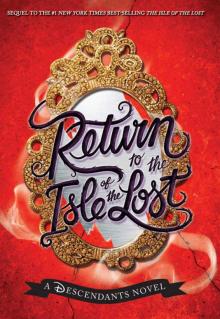 Return to the Isle of the Lost
Return to the Isle of the Lost Rise of the Isle of the Lost
Rise of the Isle of the Lost Angels on Sunset Boulevard
Angels on Sunset Boulevard Double Eclipse
Double Eclipse Blue Bloods
Blue Bloods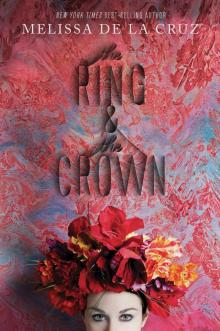 The Ring and the Crown
The Ring and the Crown The Ashleys
The Ashleys Les vampires de Manhattan
Les vampires de Manhattan The Van Alen Legacy
The Van Alen Legacy Sun-Kissed
Sun-Kissed The Isle of the Lost
The Isle of the Lost Masquerade
Masquerade Witches of East End
Witches of East End Diary of the White Witch
Diary of the White Witch Crazy Hot
Crazy Hot Lost in Time
Lost in Time White Nights: A Vampires of Manhattan Novel
White Nights: A Vampires of Manhattan Novel Revelations
Revelations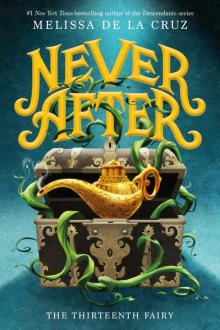 The Thirteenth Fairy
The Thirteenth Fairy The Birthday Girl
The Birthday Girl Lip Gloss Jungle
Lip Gloss Jungle Fresh Off the Boat
Fresh Off the Boat Something in Between
Something in Between Winds of Salem
Winds of Salem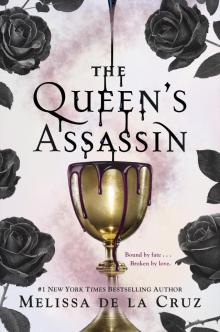 The Queen's Assassin
The Queen's Assassin Love & War
Love & War Social Order
Social Order Skinny Dipping
Skinny Dipping 29 Dates
29 Dates Popularity Takeover
Popularity Takeover Escape from the Isle of the Lost
Escape from the Isle of the Lost Beach Lane
Beach Lane Bloody Valentine
Bloody Valentine All for One
All for One Wolf Pact: A Wolf Pact Novel
Wolf Pact: A Wolf Pact Novel The au pairs skinny-dipping
The au pairs skinny-dipping Lip Gloss Jungle (Ashleys)
Lip Gloss Jungle (Ashleys) Crazy Hot (Au Pairs)
Crazy Hot (Au Pairs) Because I Was a Girl
Because I Was a Girl Blue Bloods 6 - Lost in Time
Blue Bloods 6 - Lost in Time Sun-kissed (Au Pairs, The)
Sun-kissed (Au Pairs, The) Bloody Valentine bb-6
Bloody Valentine bb-6 Golden
Golden Lost in Time_A Blue Bloods Novella
Lost in Time_A Blue Bloods Novella Alex and Eliza--A Love Story
Alex and Eliza--A Love Story Blue Bloods: Keys to the Repository
Blue Bloods: Keys to the Repository Birthday Vicious (The Ashleys, Book 3)
Birthday Vicious (The Ashleys, Book 3) Keys to the Repository
Keys to the Repository Lost In Time (Blue Bloods Novel)
Lost In Time (Blue Bloods Novel) Stolen
Stolen Girls Who Like Boys Who Like Boys
Girls Who Like Boys Who Like Boys the au pairs crazy hot
the au pairs crazy hot Blue Bloods bb-1
Blue Bloods bb-1 Witches 101
Witches 101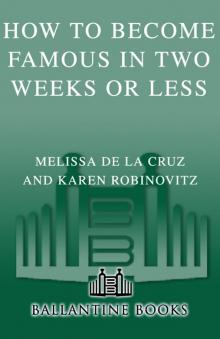 How to Become Famous in Two Weeks or Less
How to Become Famous in Two Weeks or Less Frozen hod-1
Frozen hod-1 Jealous? (The Ashleys, Book 2)
Jealous? (The Ashleys, Book 2) Misguided Angel (Blue Bloods)
Misguided Angel (Blue Bloods) Winds of Salem: A Witches of East End Novel
Winds of Salem: A Witches of East End Novel The Gates of Paradise
The Gates of Paradise Beach Lane Collection
Beach Lane Collection Wolf Pact, The Complete Saga
Wolf Pact, The Complete Saga Gates of Paradise, The (Blue Bloods Novel)
Gates of Paradise, The (Blue Bloods Novel) Vampires of Manhattan
Vampires of Manhattan Isle of the Lost
Isle of the Lost Love & War_An Alex & Eliza Story
Love & War_An Alex & Eliza Story The Ashley Project
The Ashley Project Love & War--An Alex & Eliza Story
Love & War--An Alex & Eliza Story